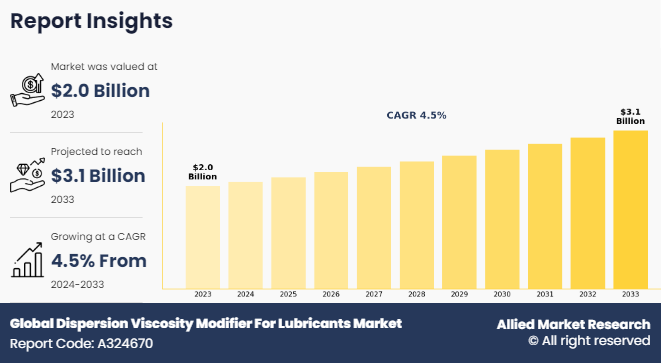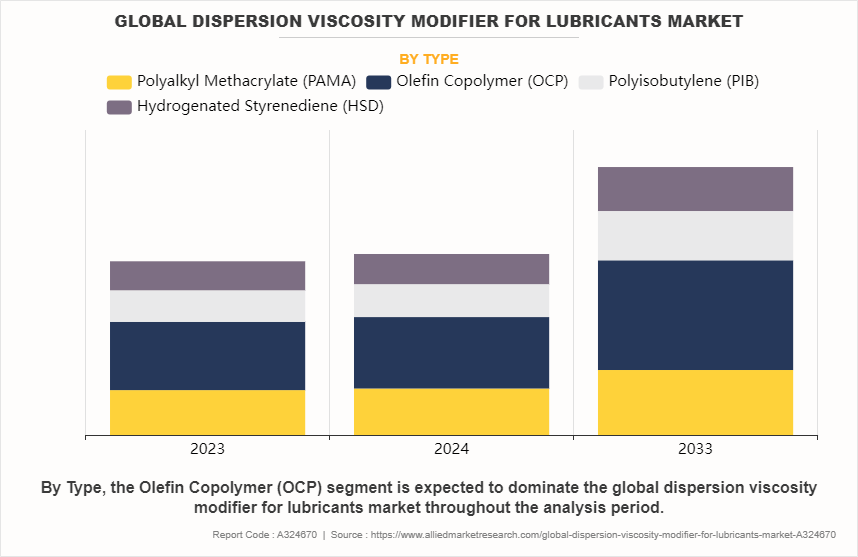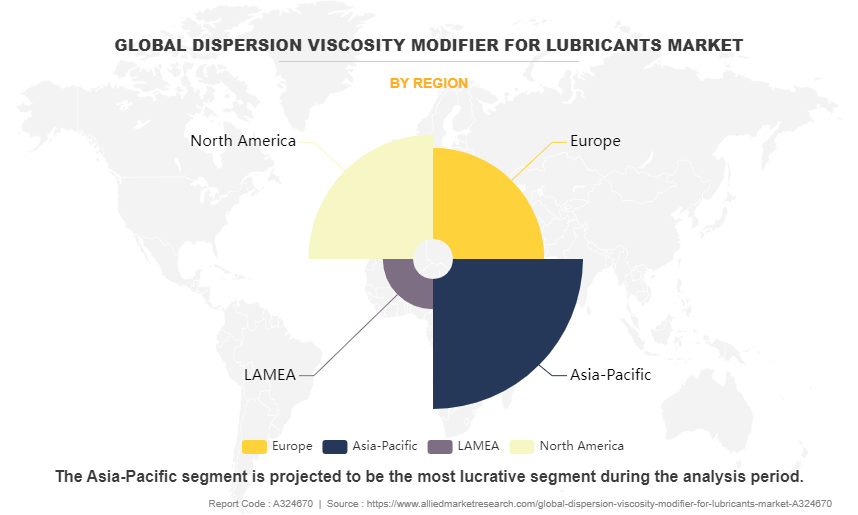Global Dispersion Viscosity Modifier For Lubricants Market Research, 2033
The global dispersion viscosity modifier for lubricants market was valued at $2.0 billion in 2023, and is projected to reach $3.1 billion by 2033, growing at a CAGR of 4.5% from 2024 to 2033.

Report Key Highlighters
The report provides competitive dynamics by evaluating business segments, product portfolios, target market revenue, geographical presence and key strategic developments by prominent manufacturers.
The global dispersion viscosity modifier in lubricants market is consolidated in nature among prominent companies such as Infineum International Limited, vinati organics limited, Kuraray Co., Ltd., The Lubrizol Corporation, RUHANI INDUSTRIES, KEMAT Polybutenes, KK India Petroleum Specialities Private Limited., Afton Chemical, Functional Products Inc, and A S Harrison & Co Pty Limited.
The study contains qualitative information such as the market dynamics (drivers, restraints, challenges, and opportunities), public policy analysis, pricing analysis, and Porter’s Five Force Analysis across the global region.
Latest trends in the global dispersion viscosity modifier for lubricants market such as manufacturer’s capacity, ongoing R&D, emergence of sustainable dispersion viscosity modifiers, and government initiatives are analyzed.
More than 2,300 dispersion viscosity modifiers-related product literatures, industry releases, annual reports, and other such documents of key industry participants along with authentic industry journals and government websites have been reviewed for generating high-value industry insights for the global dispersion viscosity modifier for lubricants market.
Introduction
Dispersion viscosity modifiers for lubricants are polymeric additives that have good soot dispersion properties and do not increase the viscosity of oil when mixed with soot. Incompletely burnt fuel tends to generate soot into the crankcase, which in turn increases the viscosity of oil. The utilization of dispersion viscosity modifiers enhances the soot dispersion performance. Some examples of dispersion viscosity modifiers include polymethacrylate (PMA) and olefin copolymer (OCP).
The market growth for dispersion viscosity modifiers in lubricants is driven by the surge in demand for high-performance lubricants that function efficiently across a wide range of temperatures. The automotive and industrial sectors require lubricants that possess good soot dispersion characteristics and maintain optimal viscosity to ensure engine protection and performance. Dispersion viscosity modifiers enhance the viscosity index by providing good soot dispersion characteristics while preventing the viscosity of lubricants to increase. This directly contributes to fuel efficiency and reduced engine wear. Furthermore, stringent environmental regulations push manufacturers to develop lubricants that minimize emissions and improve fuel economy. Innovations in polymer technology, such as polymethacrylate and olefin copolymers, offer superior shear stability and durability, supporting the rise in demand for advanced lubricants.
Despite the positive drivers, the market faces several restraints. The high cost of advanced polymeric additives is a significant barrier, particularly for smaller manufacturers who struggle to afford these premium ingredients. This restrains the manufacturers with low investment potential to enter into dispersion viscosity modifiers market; thus, hampering market growth.
On the contrary, the increase in focus on vehicle servicing and maintenance by vehicles owners boosts the utilization of dispersion viscosity modifiers that are used to disperse soot from crankshaft and make engine clean. This factor augments the sales of dispersion viscosity modifiers for lubricants market; thus, creating remunerative opportunities.
The dispersion viscosity modifier market for lubricants is segmented on the basis of type and region. On the basis of type, the market is categorized into polyalkyl methacrylate (PAMA), olefin copolymer (OCP), polyisobutylene (PIB), and hydrogenated styrene diene (HSD. Region-wise, the market is studied across North America, Europe, Asia-Pacific, and LAMEA.

In 2023, the olefin copolymer segment was the largest revenue generator, and is anticipated to grow at a CAGR of 4.9% during the forecast period. The demand for olefin copolymer type dispersion viscosity modifiers (DVMs) in lubricants is increasing due to their superior soot dispersion performance and shear stability, crucial for modern engines and machinery. These copolymers, typically derived from ethylene and propylene, ensure consistent lubricant performance across a broad temperature range, protecting against wear and improving fuel efficiency. The need for lubricants that can withstand extreme operating conditions increases as automotive and industrial sectors push for higher efficiency and durability. In addition, stricter environmental regulations and the shift toward sustainable practices drive the demand for advanced lubricants. Olefin copolymers, with their compatibility with various base oils, including synthetics, enable the formulation of eco-friendly, high-performance lubricants, meeting both regulatory requirements and industry needs. These factors altogether may fuel the demand for olefin copolymer-based dispersion viscosity modifier market during the forecast period.

By region, the Asia-Pacific dominated the market in 2023, and is anticipated to grow at a CAGR of 5.0% during the forecast period. China is a major player in the Asia-Pacific dispersion viscosity modifier for lubricants market, driven by its massive industrial base and rapid technological advancements. The country’s extensive manufacturing sector, encompassing automotive, aerospace, electronics, and heavy machinery, demands high-performance lubricants to ensure operational efficiency and equipment longevity. The automotive industry is a significant driver, with China being the largest automotive market globally. According to a report published by the Italian Trade Agency in 2023, the sales of passenger vehicles rose by 10.9% in February 2023 as compared to February 2022. The increase in production of vehicles, including electric vehicles (EVs), necessitates advanced lubricants that can operate efficiently under various conditions, driving the demand for high-quality dispersion viscosity modifier.
The global dispersion viscosity modifier in lubricants market profiles leading players that include Infineum International Limited, vinati organics limited, Kuraray Co., Ltd., The Lubrizol Corporation, RUHANI INDUSTRIES, KEMAT Polybutenes, KK India Petroleum Specialities Private Limited., Afton Chemical, Functional Products Inc, and A S Harrison & Co Pty Limited. The global dispersion viscosity modifier in lubricants market report provides in-depth competitive analysis as well as profiles of these major players.
Key Benefits For Stakeholders
This report provides a quantitative analysis of the market segments, current trends, estimations, and dynamics of the global dispersion viscosity modifier for lubricants market analysis from 2023 to 2033 to identify the prevailing global dispersion viscosity modifier for lubricants market opportunities.
The market research is offered along with information related to key drivers, restraints, and opportunities.
Porter's five forces analysis highlights the potency of buyers and suppliers to enable stakeholders make profit-oriented business decisions and strengthen their supplier-buyer network.
In-depth analysis of the global dispersion viscosity modifier for lubricants market segmentation assists to determine the prevailing market opportunities.
Major countries in each region are mapped according to their revenue contribution to the global market.
Market player positioning facilitates benchmarking and provides a clear understanding of the present position of the market players.
The report includes the analysis of the regional as well as global global dispersion viscosity modifier for lubricants market trends, key players, market segments, application areas, and market growth strategies.
Dispersion Viscosity Modifier For Lubricants Market Report Highlights
| Aspects | Details |
| Market Size By 2033 | USD 3.1 billion |
| Growth Rate | CAGR of 4.5% |
| Forecast period | 2023 - 2033 |
| Report Pages | 173 |
| By Type |
|
| By Region |
|
| Key Market Players | KK India Petroleum Specialities Private Limited., KEMAT Polybutenes, The Lubrizol Corporation, vinati organics limited, Kuraray Co., Ltd., Afton Chemical, Infineum International Limited, A S Harrison & Co Pty Limited, RUHANI INDUSTRIES, Functional Products Inc |
Analyst Review
According to the CXOs of leading companies, the global dispersion viscosity modifiers for lubricants market is poised for significant growth driven by increase in demand for high-performance and fuel-efficient lubricants that have good soot dispersion characteristics. Viscosity modifiers enhance soot dispersion properties while maintaining the temperature-viscosity behavior of lubricants, ensuring optimal engine performance across various temperatures. As automotive and industrial sectors prioritize sustainability and efficiency, the role of advanced dispersion viscosity modifiers becomes critical. Innovations in polymer technology, such as polymethacrylate and olefin copolymers, are expected to dominate the market, offering superior soot dispersion and fuel economy benefits.
Moreover, stringent regulatory frameworks across regions, such as the EPA standards in the U.S., REACH in Europe, and JASO standards in Japan, necessitate compliance and continuous improvement in lubricant formulations. Companies invest heavily in R&D to develop additives that meet these regulations while providing competitive advantages. The focus on reducing greenhouse gas emissions and enhancing engine protection aligns with the global shift toward greener and more efficient technologies, positioning dispersion viscosity modifiers as a pivotal component in the next generation of lubricants.
Escalating demand from automotive sector and technological advancements in industrial machinery sector are the upcoming trends of global dispersion viscosity modifier for lubricants market in the globe.
Soot dispersion is the leading application of global dispersion viscosity modifier for lubricants market.
Asia-Pacific is the largest regional market for global dispersion viscosity modifier for lubricants.
The global dispersion viscosity modifier for lubricants market was valued at $2.0 billion in 2023, and is projected to reach $3.1 billion by 2033, growing at a CAGR of 4.5% from 2024 to 2033.
The global dispersion viscosity modifier in lubricants market profiles leading players that include Infineum International Limited, vinati organics limited, Kuraray Co., Ltd., The Lubrizol Corporation, RUHANI INDUSTRIES, KEMAT Polybutenes, KK India Petroleum Specialities Private Limited., Afton Chemical, Functional Products Inc, and A S Harrison & Co Pty Limited.
Loading Table Of Content...
Loading Research Methodology...



